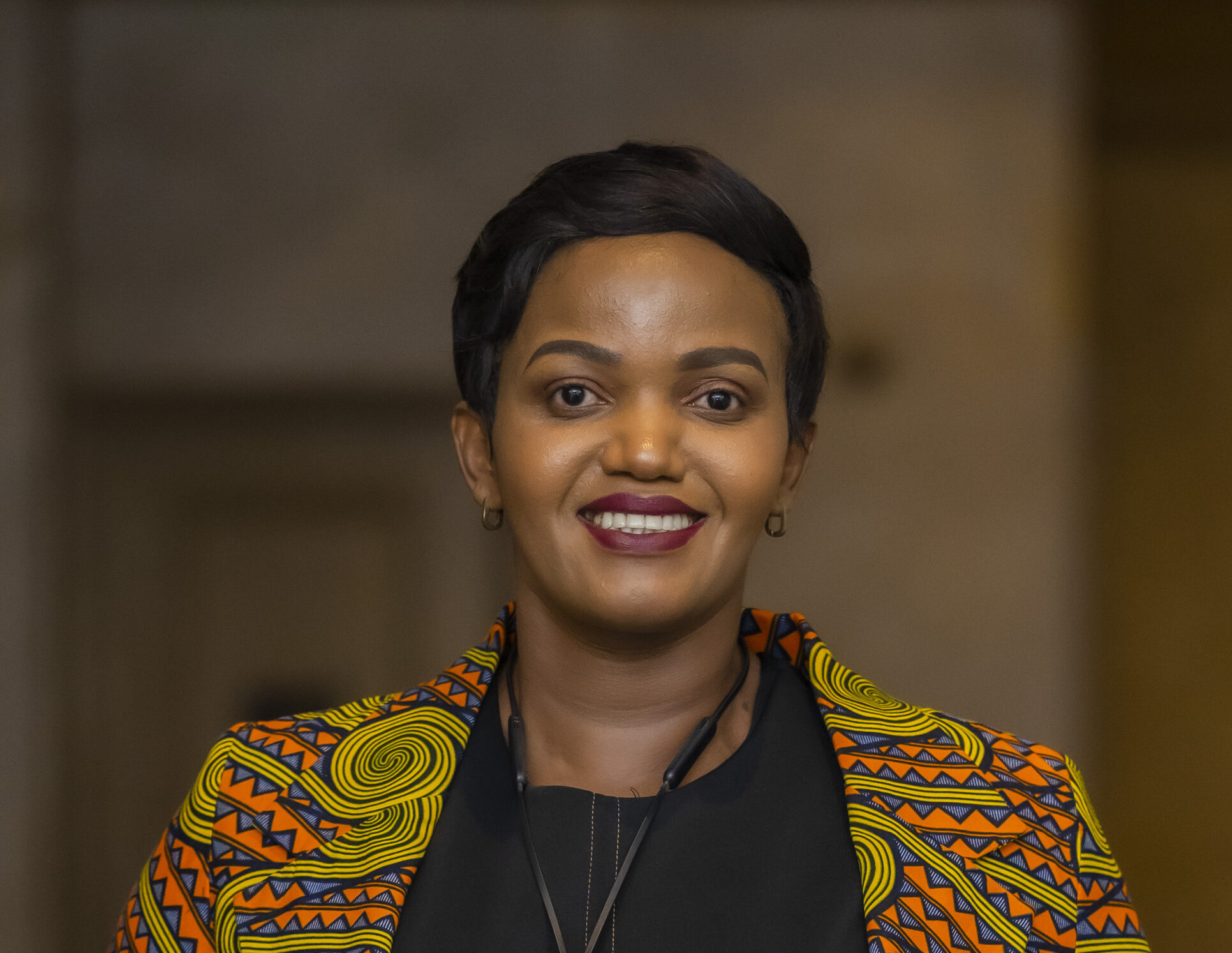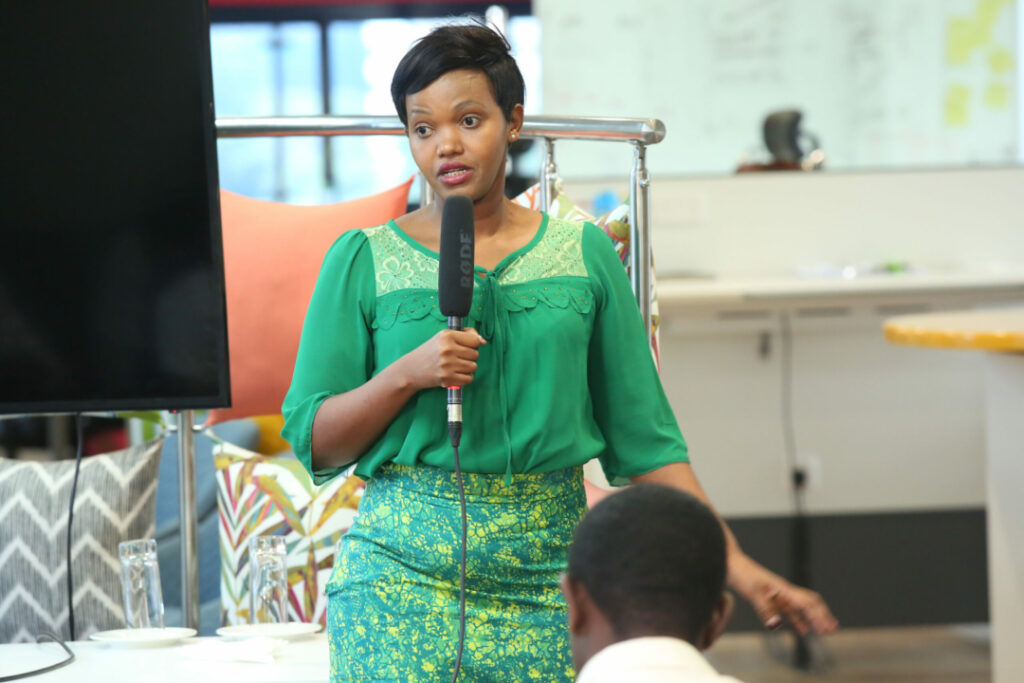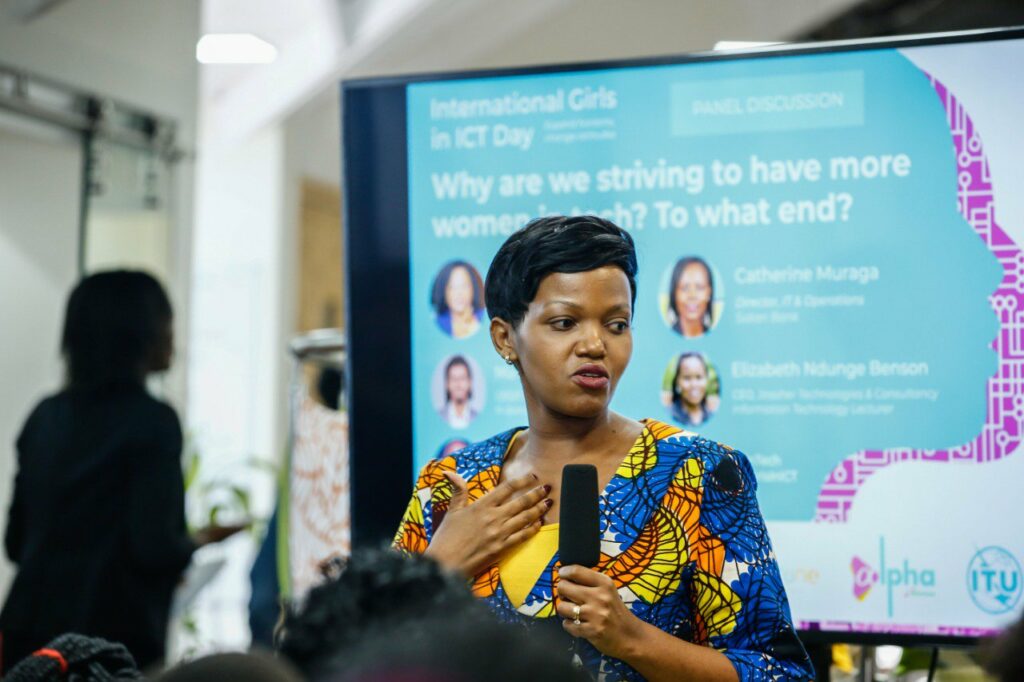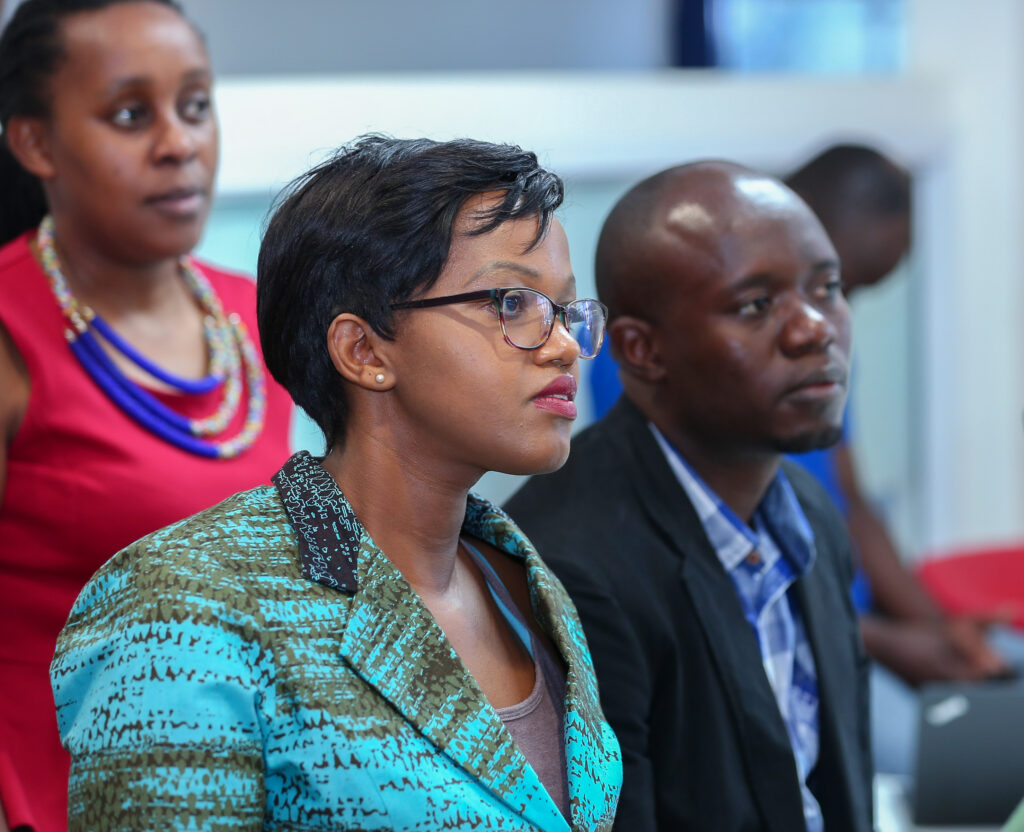advertisement
Becoming Dr Shikoh Gitau

The story according to my mother is that I was a maths geek. Always have been since I was in nursery school. I always had an aptitude for maths. Mrs Loice Koile was my teacher. She called me and told me “I have seen you and how you approach maths. You are not like the other girls. You do it very well in a special way. I’d love for you to continue doing it. If you could come do a maths challenge, I will help you.” I got a maths counterbook – the A4 size. I would do my homework on the left, and she would correct me on the opposite page.
I went to Kisumu Girls where they had this old Carey Francis book. I used it and became really good at solving math problems. I would look at the root cause of the problem and try to solve it. It’s how I look at any situation. I’m always trying to figure out the process before coming back to the answer. I tutored Forms 1 and 2 when I was in Form 4. I know people hear Dr Shikoh and think I had an easy life. I didn’t get an A in school. I actually got a C.
I got a D in English because I really hated English. I used to read Mills & Boons and Sweet Valley High instead of the set books. I was not inspired to learn English and Kiswahili. I spoke mathematics. The principal and maths teacher told me to repeat, telling me it was not a reflection of my true grade. I even considered repeating. But the good thing is back then there were pre-university courses. I enrolled at the African Nazarene University where I got straight A’s. So much so, that the lecturers didn’t understand why I was enrolled in pre-university classes.
advertisement
What I learned between high school and university is you cannot take for granted what God has given you for free. You get muscles, but you have to work them. It’s the same thing with smarts. Many smart people, including those who got A’s (and I wonder where they are now), did so because they’re naturally smart. You expect things to happen to you obviously and freely and do not feel the need to exert yourself. If I had gotten that A in high school, I would be mediocre because I’d be expecting things to happen to me, and I wouldn’t be going after things I want.
Nazarene University was a second chance. I had frankly been lazy, and I didn’t study except for maths, so I never got a university grade. Pre-university was the purgatory to my destiny, giving me an opportunity to redeem myself. I had a desk in the library that nobody touched. I was there all the time. I brought up my readership skills and had no problem being the geek who went to funkies (school functions) with books and reads on the bus. I worked so hard on my academics. I was top of my class all through university.
There were no clubs, so I started one for women in response to the HIV and AIDS pandemic at the time. In high school, I lost six or seven teachers and a couple of classmates to AIDs. I was just responding to the needs of society. I found this part of me that was a born leader. I’m a twin. A first-born woman. My sister is four minutes younger. I used to call her Baby. I never had a chance to be a baby. I was born an adult. I did things in campus to bring myself out as a leader.
advertisement

At the same time, I was very clear on my priority which was to work really hard and pass. I would later meet Dr Kathy from MIT who noticed and admired how I approached my studies. She was the first woman PhD and in Computer Science at that, that I had ever met. I greatly admired her. She encouraged me to work hard, get top marks, and graduate; so that someone would pay for my master’s and PhD. I’m not from a fancy family. I was sent home so many times in university for lack of fees until this German couple found out about me and gave me a scholarship.
When I was nine, I remember seeing a woman graduate with a PhD and get capped by the president. I told my mum one day that would be me.
advertisement
I got a job with a start-up before I graduated. I told myself one day I would run a start-up, and the skillsets I needed to do that, I would learn there. While there, I applied for different scholarship programmes. I just knew that I would get one for my master’s because there was no way I could afford to do it on my own. I looked up the Rhodes Scholarship from the University of Oxford. I was long-listed, then short-listed, and then went for dinner at the UK High Commissioner’s home where I was interviewed by one Dr David Ndii (a renowned Kenyan economist). I didn’t get it. I was heartbroken. I learned the value of getting the right person to write a reference letter. That it should be someone committed to your growth.
It eventually emerged that this was why I didn’t make the cut. I got a random person who didn’t know me well but who also didn’t want to say no, to write the letter. However, it is during this research that I stumbled across the University of Cape Town. It so happened that they had just started a course on Computer Science that intersected with social development two years prior. I applied through DHL. There was no online application back then. As I was waiting, I moved jobs to the Centre for Multiparty Democracy. They had a South African partnership and connection with UCT. I told her about my application. She volunteered to take a fresh application form personally to the registrar there. Within two weeks, I had my admission letter. There was a catch. They had not told me about my residency status or my scholarship status.
This is now eight months into my graduation. The Germans who funded my undergraduate course at Nazarene told me they would pay for a one-way ticket to South Africa. I had savings I had been squirrelling away. I took this, took a huge risk, and went to UCT. Somehow, I got a full merit scholarship AND a departmental scholarship, and because my school fees were sorted, I was regarded as South African and instantly got residency.
I always tell people I was so afraid of getting onto that flight. My mother was crying hysterically at the airport asking me if I was serious. She knew the status of money because we didn’t have any and was sure she was losing her daughter to South Africa. During my first two weeks in Cape Town at Longstreet, I lived on top of two bars on the fourth floor. For me to go to my house I went through a club, a lounge, then my house used to be on top of that place, but I still lived.
I knew the future was going to be great. I just worked hard. I got a side hustle to make sure I didn’t starve, and then my supervisor gave me a research and assistant job. To keep a merit scholarship, you have to keep your grades high. I worked so hard, the people in my lab to date made fun of how I used to write papers. I had to prove myself. There were no black women there. There were only two girls – myself and my friend Ilda. When I completed my Masters, my supervisor told me I would be leaving UCT with a PhD. I had promised my mother I wouldn’t return home without one. And I got a scholarship from the founder of SAP, Hasso Plattner. He wanted to experiment with Africa, and I was it. They had no idea how their project would go, but if I was willing, they would pay for my PhD.
Of course, I took the opportunity, and my PhD took place between UCT and Berlin. Every summer and part of winter, I was in Berlin. It meant double examinations. In UCT it was smooth. I wrote a research paper and dissertation. In Germany, I had to write three papers every year and nine before I graduated. A paper could be rejected multiple times. I remember at one point, my father thought I died because I deactivated my Facebook account to focus on writing. Nobody knew where I was. My phone was off because I was just studying.
At the time, I did this experiment on how you could solve gender-based violence in South Africa, specifically, if you are walking down the street. There were a lot of rape cases, and I came up with the concept of using network triangulation. It means if a woman is walking and they have signed up for this service and pass a ‘black corner’ which was a common rape spot, they would receive an automatic SMS telling them to be careful, there has been a reported rape case there. I got a scholarship to go to Atlanta to present this paper.
One of the attendees was Meghan J. Smith (who later became the CTO for the Barrack Obama administration), then a Vice President of New Business Development at Google. She was very much in love with Africa and the emerging market. The next day I attended an event where she was the keynote speaker, and she referenced my paper. It attracted a great deal of attention and led to Google offering me a job. I was torn. I told them I was still doing my PhD, and I planned to always go back home and work in Africa. I conferred with my supervisor who told me, “Listen. Just go and learn. You are not signing your life away to Google. If it doesn’t work out, you can always leave.”
I went through the recruitment process and then disclosed that I would only be available in December once I had submitted my dissertation for which I got an award -the first African to win the Google Women Tech Makers award. For Google to ask to hire me as a UX Researcher / Designer – Emerging Markets (Dec 2010 – Nov 2013) was beyond my wildest dreams. I didn’t know anyone who worked for Google that looked like me.

I learnt many of my management and leadership skills at Google, where people were given the freedom to think and innovate. A Google friend told me I needed to have three objectives at Google and once achieved, I should relook if I wanted to stay. If achieved, I could move to another place.
I built a product from scratch – BebaPay. James Mwangi, Equity Founder & CEO, launched it. People had rejected it within Google, but we got the data and justified to Google why they needed to invest in it. It helped me understand how innovation works. It takes time, and you kill some (BebaPay was phased out eventually), but you need to give people the freedom to experiment. That is foundational in my career. I also got that opportunity when I worked at Microsoft as a Research Assistant (Nov 2008 – Dec 2010).
I maxed out my passion at Google. Briefly found myself in India where I felt dissatisfied. I was offered a job by IBM Research, but I was reminded by a friend of my dream to change Africa using technology. I briefly worked for an NGO, but I hated it because I realised I didn’t want to create dependency syndrome on the continent. I want to empower people. Then I got a call to join AfDB.
At the Africa Development Bank, Ivory Coast, I did amazing and impactful work from Jan 2015 to Aug 2017. It takes forever to get a project done at AfDB, but once it’s done, it impacts millions. There was a high level of satisfaction. But I wanted to come back to Kenya. I had been everywhere else for a long time. I really wanted to come home. I had just had my baby. Then I got a call from Safaricom. They were setting up an innovation hub and I had a 360 understanding of innovation.
Could I help set up the innovation hub up? The late Bob Collymore was CEO at the time. He was a visionary and amazing. The way he painted the story of the future of Safaricom showed me a Safaricom that would change the world. I wanted to change the world. I wanted my work to be more impactful in Kenya and the world. I had seen what was out there in the world. I wanted to be able to build something back home. So I joined Safaricom in Sept 2017 and we did groundbreaking work with me as Head of Products & Lead (Ag. Chief Innovation Officer) Alpha, till Jan 2020.
Unfortunately, Bob died. It was my biggest lesson on a leadership succession plan. The fact that you are not there does not mean the work is not important. The work needs to continue and outlive you. That’s a very hard thing for Africans especially. I say this as an African so I can say it authoritatively. It is a very hard truth for Africans to think about is who is going to take over after I have left. You always have to think about that. I don’t want my work to leave with me. I want it to stay and continue impacting. It is very strategic for me. I tell everyone I want Qhala to be a 100-year-old company. This means I have to confront my own mortality and think of what happens;, what I need to put in place so it can outlive me. Not only outlive you, but your children too. You are looking at a generation away from you.
Qhala came after Alpha. After we were told Alpha no longer exists and I need to let go of my team I had to do one of the hardest things I have done in my life. Standing in front of that amazing team and telling them I had to let them go. Hugging each one of them with tears. Telling them I was sorry I let them down. I took it very personally. I had let them down. I fought for Alpha. But because I couldn’t save it, I took it personally. I fell into a depression. Like shrink-going, therapist-seeing depression worth a lot of money. I was this close antidepressants. I tried as much as possible placing the team in different start-ups. That’s the good thing about having friends in the ecosystem and being a team player in it. But there are a few people who didn’t land work. It took me time to heal.

When I left Safaricom, I think I had 15 job offers within a week because word got around. Instead, I went to the US and Rwanda. I took time off to just be. My spiritual mentor called just to pray for me because they knew I was not in a good place. I had two PhD advisors; Gary and Jonathan. Gary passed away a few years ago. Jonathan was my boss at Microsoft, and he ended up being my PhD advisor. He called me and said he heard I was looking for a job. “I can either give you a job or give you your first client,” I asked why he would want to give me my first client when I didn’t have a company. “Because you are going to start a company. You have been wanting to change the world using technology. Why don’t you change it on your own terms?” That’s how Qhala was born.
Qhala is Zulu for “to start” or “to spark.” It’s going to catalyse Africa’s digital future.
Our first major project was around COVID-19 and modelling COVID-19 data for the Kenyan government. In the process, we started building AI tools to be able to respond to the mental health crisis that was happening during the pandemic. We have been working silently on AI. And last year I was invited to a conference to talk about AI in Africa. I kept telling them we don’t have AI in Africa. Why? We didn’t have enough data to train our models, so we needed to find data to train models. Data is the foundational element of the AI ecosystem. If you don’t have that, what AI are we talking about? Can we start solving for skills to be able to build what we want to see in the world? Can we build the whole ecosystem? We have been incubating a small AI lab, so we decided to be more public in terms of the policy part of it. We’ve launched the AI 4-Horse Men framework paper.
We are working with other partners. The future of work is going to be a thing. I believe if we can solve youth unemployment, we will have so many things. We are a young continent. How do we solve it? By finding jobs out there. Europe is aging with a very small young population and even their young population is not able to take up all the jobs that are there. So, they have a talent crisis. That’s most of Europe. How do we solve this? First, let everybody immigrate. Secondly, send the jobs here. We are working very deliberately on building an ecosystem to play around the future of work in Africa.
In 2050, Africa will be the world’s workforce. How are we preparing for it? How are we preparing our education system, our young people and our infrastructure for it? We have a five-pillar theory around the future of work. We need talent, skills, infrastructure, policy, and market. Someone must be working on these areas. Our goal is to solve for and to make sure that AI is utilised well and responsibly to increase our innovativeness because this is the one area in which we have a card to play. The rest of the world does not have data like Africa has.
Right now, for AI to be fully inclusive, they need our data. If they are asking for our data, we need to ask them to set us up with computing on the continent. Can you empower our kids by training them in the right skills? Can you help us with data use cases? Can we have a negotiating card on the table? Technology was never seen as a way to employ people. The more the President talks about it, the more it changes the mindset of people. That’s the first thing we need to do. We are sending a great signal to the world saying we have great talent, so we are working with partners, development partners and institutions to make sure that what we are training is commercially viable. Because we are selling our young people as our raw material. But we need to start the value addition so that they can be commercially viable and bought at high stakes. That’s what we are pushing for at Qhala.
This article first appeared in the May 2024 issue of CIO Africa Magazine.